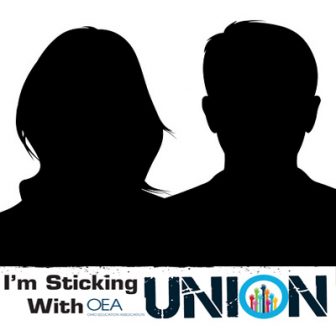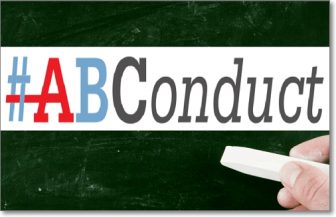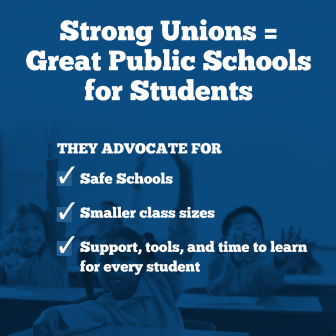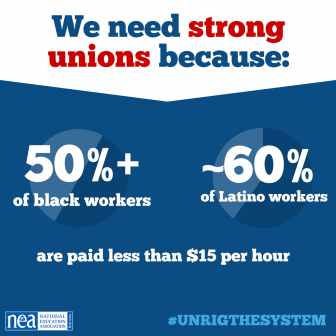OEA VP Scott DiMauro: Graduation Requirements & State Takeover
(MARCH 12, 2019 • COLUMBUS, OH) President Kohler, Vice President McGuire, Superintendent DeMaria, and members of the Board, my name is Scott DiMauro.
I am a high school social studies teacher from the Worthington Schools currently serving as Vice President of the Ohio Education Association.
On behalf of OEA’s 122,000 members, I appreciate the opportunity to provide comments on the Resolution on today’s agenda to supplement and clarify the high school graduation requirements recommendations addressing Section 5 of House Bill 491.
We appreciate the good work of State Superintendent Paolo DeMaria and the State Board of Education in your efforts to come up with recommendations for a new, permanent set of graduation requirements that, in accordance with Substitute House Bill 491, “reduces reliance on state testing, encourages local innovation, and supports student readiness for a career, college and life.”
In particular, OEA supports the superintendent’s recommendations to support students with deliberate planning and career advising, to provide early intervention for middle school and high school students not on track to meet graduation requirements, and to provide training for teachers and others who will evaluate non-standardized demonstrations of student learning.
We urge the Board to go further in looking at ways in which to instill creativity, imagination and a desire to learn in the high school experience by rolling back the excessive burden of standardized testing.
Ohio is in the minority of states that exceeds minimum federal testing requirements for high school students. The number of end-of-course exams, as well as the stakes attached to them, must be reduced.
For example, the testing burden could be further reduced, and teachers given more time to teach, by re-examining the ACT/SAT testing requirements, and reconsidering what is needed for career-technical and other students who are pursuing alternative pathways to graduation.
It is also important that educators have access to reliable test item analysis information that will help them better prepare their students for success.
In any deliberations related to testing and graduation requirements, we urge policymakers to show that they value the professionalism and good judgment of Ohio’s educators who have dedicated their careers to the success of all our students, including incarcerated youth, students with disabilities, English learners, students with interruptions in their formal education, students in poverty, and students of color.
And last, but not least, OEA urges the Board to stick with its original recommendation to have new graduation requirements take effect with the class of 2022.
It is simply unfair and unreasonable to expect that students who are already half way through their high school careers should be expected to meet a whole new set of requirements for graduation.
They, and the education professionals who support them, need time to plan for these changes. The original Superintendent’s Advisory Committee, which consisted of representatives of the K-12, higher education, and business communities, was right to recommend that any new requirements take effect with an incoming freshman class.
We encourage the Board to stand by the recommendation passed in November 2018 and reject an acceleration of the implementation timeline as presented in the draft resolution before you today.
Thank you for your time and attention.

Scott DiMauro
Blog: The Antidote to Despair
By Julie Rine is an English Instructor and an Academic Challenge Advisor at Minerva High School, Minerva, Ohio.
 It’s easy to feel hopeless and overwhelmed right now, isn’t it? The Supreme Court’s decision regarding the Janus case, while not unexpected, still stung. The move by the Court has the potential to weaken unions, many sources say, and the decision has even been referred to as a “crippling blow” .
It’s easy to feel hopeless and overwhelmed right now, isn’t it? The Supreme Court’s decision regarding the Janus case, while not unexpected, still stung. The move by the Court has the potential to weaken unions, many sources say, and the decision has even been referred to as a “crippling blow” .
There are certain unfortunate situations in life that we can’t control, and it’s important to recognize those and let them go rather than devote energy to a state of affairs that cannot be changed.
There are also situations in life that we CAN impact, with our actions, our words, our advocacy, but even in those situations, there are moments when you have to let go, politically, personally, emotionally. You have to take a break, look away, check out, turn off the news and turn on a Friends rerun, lose yourself in a good book, take a few deep breaths and decide to let go and let someone else take up the cause for awhile. Those “let go” moments are critical to maintaining good mental health and restoring energy to jump back into the fray when we are refreshed and ready to go.
But this is not one of those times. This is not a “let go” moment. This is a “Let’s Go” moment.
The media would have you believe that the Janus ruling will lead to fewer union members which means a reduction in funds which equals unions cutting jobs and services and benefits. If you believe the news, soon our teacher unions will be so weak and ineffective that teachers will not be able to influence an impressionable kindergartner, let alone legislative policies.
Don’t believe the hype.
If anyone is equipped to turn a bad roll of the dice into an opportunity to change the game, it’s teachers.
On a daily and weekly basis, we think on our feet, we adapt to a snag in the routine. We reflect on what worked and what didn’t and make adjustments in the three minutes between classes, a task that would take Congress three months. We take on whatever challenges exist in our communities and in our classrooms and we overcome them. We don’t stop there, either. Most of the time, we not only overcome the challenges we face, challenges which can change from year to year and week to week, (sometimes even minute to minute!), we create new programs, new methods, and new realities that are often more effective for our students than what existed before the obstacle presented itself.
I don’t care what your political leanings are, if you are a teacher, you rival only parents in your fierce desire to protect kids and prepare them to succeed in the future.
The union helps us do just that. Through the union, we can fight for what our kids need to succeed, such as smaller class sizes, adequate and up-to-date academic resources, onsite counselors and mental health professionals, and a safe environment in which to learn. The union also helps us fight for what teachers need to help students succeed, such as adequate planning time, meaningful professional development, continued opportunities for further education and training, sufficient time to work as teams to tackle problems rather than as isolated instructors behind our classroom doors, and yes, a fair salary which allows us to focus fully on our students and our own families instead of squeezing in hours away from both while we work a second job to make ends meet. The trickle-down effect here is obvious; when teachers lack support and resources, kids lose the effective education they deserve.
So what can we do?
The decision will not be reversed, and even worse, it appears that a new Justice will be seated who may have equally damaging views of unions and public education.
First, we must remember that Supreme Court Justices are not the only ones allowed to issue opinions. We can write letters to the editor of our local papers, and we can routinely call or write our elected officials to make our voices heard and our opinions known.
Secondly, we can actively recruit members, especially young teachers, to not only join the union, but to become active in the union. Retaining or gaining members will of course help the union financially, since our dues dollars provide us with the resources and training necessary to be effective advocates for our students. But we don’t just need the dues money. We need active and energetic members, more than ever before. Money talks, but members act.
Thirdly, we can help register new voters. If we want a future in which citizens are active participants in the democratic process (whether they are on “our side” or not), then we must emphasize the importance and value of our right to vote, and then take the practical step to register young voters. It is a simple process. There is no reason why every 18-year-old student who graduates from an American high school should not be registered to vote.
 We can’t force them to register, however, so the goal should be to get them excited to register.
We can’t force them to register, however, so the goal should be to get them excited to register.
By teaching our students how to read a variety of sources on any given topic and then to form their own opinion, we help them become critical thinkers. Critical thinkers are often eager to make their positions known, and the most powerful way to do that is to exercise the right to vote. Few moments of my teaching career have been as special to me as when I registered a student to vote and she literally high-fived me and yelled, “I can vote, I can vote!” This is the enthusiasm we must seek to engender in our classrooms.
Perhaps most importantly, we can get involved in local and OEA efforts to elect pro-public education and pro-union candidates. We can work phone banks, canvass door-to-door, talk to our colleagues and friends about why we support certain candidates. We must follow that up by voting for candidates who support us as public school teachers and as union members, up and down the ballot, in local elections, in primaries, in midterms and in presidential elections. These actions are particularly important in Ohio this year, as we will be voting for a senator and a governor.
Political defeats can be discouraging, but nothing feels worse than knowing you could have done more to ensure victory when instead you chose to sit on the sidelines. We must take our frustration and allow it to motivate us to take action.
Sure, the Supreme Court decision is a setback, a challenge to be overcome. But a “blow” to unions? I don’t think so. In fact, I think they might have just poked the beast. Joan Baez said “Action is the only antidote to despair.” So don’t despair. Don’t make this a “let go” moment. This is a “LET’S GO!” moment and I have no doubt that we will persevere and succeed. The teachers’ unions are strong because teachers are strong, and we are stronger when we stand together, as friends, as colleagues, and as proud union members.
![]()
— Julie Rine is an English Instructor and an Academic Challenge Advisor at Minerva High School, Minerva, Ohio.
American Education Week — Keeping Students Safe & Secure
During American Education Week (Nov. 12-16, 2018), the Ohio Education Association is taking the opportunity to raise awareness of, and to help eliminate, the stigma of managing a disability or a mental illness.
[Video: Keeping Students Safe — Andrea Beeman, Special Education Paraprofessional, OEA/Maple Org. Support Team]
Each morning, millions of school children face the challenge of living with an impairment, mental illness or disability.
Conditions range from Attention-deficit/hyperactivity disorder, drug dependency, and depression to varied spectrum disorders.
Despite their prevalence, unwarranted assumptions and avoidance by other are also, unfortunately, widespread.
Accordingly, the OEA has called upon state lawmakers to implement a comprehensive school safety strategy that includes meeting mental health needs in schools by providing appropriate supports for our students.
These strategies must not only include essential physical security issues, but also addressing mental health in our curriculum, and appropriate staffing and student support in the form of adequate numbers of counselors, nurses, social workers, and mental health specialists to ensure that all students’ needs are met.
Similarly, the OEA has recently:
- Opposed a plan to use federal funds to buy guns for teachers;
- Sponsored the 2018 National Dropout Prevention Network Conference; and,
- Advocate for programs that establish and support safe learning environments that are free of crime, drug use, and other disruptions.
To learn more about where OEA members collectively stand on the issues, click here! | #WeLoveOurESP | #AEW2018
12,631 Thank-Yous! — Happy National ESPs Day
The Ohio Education Association is extending a hearty thank-you to each of our 12,631¹ Education Support Professionals (ESPs) in recognition of National 2018 Education Support Professionals Day.
Observed annually, National ESP Day honors the contributions of school support employees.
These support professionals provide invaluable services and are essential partners in the children’s education process.
National ESP Day honors the work of school secretaries, classroom aides, cafeteria workers, maintenance workers, bus drivers and the others that help and do their part in making public schools great for every child so that they can be safe, learn, grow and achieve.
About American Education Week
National ESP Day is part of the NEA’s 97th annual American Education Week celebration, November 12-16, 2018. National ESP Day is observed on Wednesday of American Education Week. Celebrated the week prior to Thanksgiving, American Education Week began in 1921 with the NEA and the American Legion as cosponsors. The goal was to generate public awareness and support for education because of concerns over illiteracy. A year later, the U.S. Office of Education signed on, and the PTA followed in 1938. | #WeLoveOurESP | #AEW2018
![]()
¹ Count as of October 31, 2018, OEA Membership Office
OEA ESP Aspiring Teacher Scholarship

The $4,000 ESP Aspiring Teacher Scholarship is presented each year to an Education Support Professional member currently enrolled in an undergraduate teacher education program in Ohio or a senior-level education student who has been formally accepted for graduate study in a master’s degree of education program at an accredited Ohio college or university.
Applicants must be current members of the Ohio Education Association. Current members of the OEA Board of Directors and association staff members are not eligible for this scholarship. In addition, OEA Awards and Scholarship Committee Members are not eligible for two years after completion of service on the committee to apply or to be nominated.
The award will be presented at the OEA Spring Representative Assembly.
The online nomination form must be completed in a single session, as you will not be able to save, and return to it at a later time without starting over. In addition it must be received on or before February 29, 2024. Late applications will not be considered.
TIP: Consider using this nomination worksheet as a guide prior to completing the online form. This guide can not be submitted in lieu of the online nomination form.
Please click here to see the rubric that the OEA Awards Committee will use to evaluate each submission.
→ Back to the Scholarships, Grants & Awards Home Page
#ABConduct Tip Sheets
 The Ohio Department of Education and Ohio Education Association has a series of career tips on how to recognize as well as address ethical dilemmas.
The Ohio Department of Education and Ohio Education Association has a series of career tips on how to recognize as well as address ethical dilemmas.
The initiative is supported by the Buckeye Association of School Administrators (BASA), Ohio Association of Secondary School Administrators (OASSA), Ohio Association of Elementary School Administrators (OAESA), and the Ohio Federation of Teachers (OFTA).
- #ABConduct Tip 1 | Be Smarter Than Your Smart Phone
- #ABConduct Tip 2 | When a Good Coach Goes Afoul
For more information about #ABConduct contact, the Ohio Department of Education Office for Professional Conduct at 614-466-5638 or visit education.ohio.gov/ABConduct.
![]()
 Oh Yes, We’re Social — Join the Conversation!
Oh Yes, We’re Social — Join the Conversation!
![]()
You Cannot Silence the Voice of Working People

Teaching children is pretty wonderful.
This has been my passion and in the 19 years that I taught, I learned from and have been inspired by my colleagues. I have also been moved by the actions of fellow union members who fought for better wages and safe working conditions.
The energy we are seeing with teachers standing up in the neighboring states of West Virginia and Kentucky and elsewhere as the #RedForEd movement spreads across the country is unparalleled in recent history. Public opinion is with us. A recent poll found that 62% of Americans believe the country is better off with stronger unions.
Yet, while this happening, amid the highest level of support for unions in 15 years, the US Supreme Court in a narrow 5-4, politically-motivated decision ruled that unions – specifically public employee unions — should be weaker. The Supreme Court ruled in the case of Janus v. AFSCME, Council 31 to further tilt the playing field in favor of the wealthy and corporate interests.
The court overturned 40 years of precedent in deciding that requiring so-called fair-share fees to be paid by people who choose not to join a public-sector union but who enjoy the benefits of union representation somehow violates the First Amendment of the Constitution. This doesn’t make sense, and it’s not right.
It also doesn’t make sense that so many people are finding it difficult to get by and provide for their families, no matter how hard they work. It doesn’t make sense that people are more productive than ever, but they’re working longer hours for less money and fewer benefits. And it doesn’t make sense that all this is going on while a handful of very wealthy people have seen their salaries and holdings skyrocket. It is shameful that the wealthy special interests behind the Janus case have succeeded in manipulating the highest court in the land to do their bidding.
"I believe deeply in the power of our collective voice to make sure that every teacher and student has the resources they need to be successful."

I believe deeply in the power of our collective voice to make sure that every teacher and student has the resources they need to be successful. When unions negotiate for working conditions in the classroom, they also negotiate for the conditions in which our children learn. When our unions advocate for us as educators, they also advocate for the students we serve.
Public service workers-teachers, social workers, firefighters, and nurses are more determined than ever to stick together in their unions. Unions remain the most effective vehicle for the power in numbers needed for working people to secure their rights and freedoms, and they provide a pathway to the middle class.
The truth is, when unions are strong, the entire community benefits. Unions use their collective voice to advocate for policies that help all working people — like increases to the minimum wage, affordable health care and great public schools.
Unions help close the pay gap for women and communities of color who have been systematically disadvantaged due to discrimination and prejudice.
African-American women in unions earn an average of $21.90 per hour, while non-union women earn $17.04. When Latinos are members of a union, their median weekly income increases by more than 38 percent.
The wealthy special interests that have benefited from an unfair, unbalanced playing field are now intent on tilting that playing field even more by attacking public-sector unions.
It’s driven by ideological extremists who oppose our basic right to organize. And it’s an attack on more than the men and women who are teachers and custodians and first responders; it’s an attack on anyone who wants to use their voice to fight for something better for their communities.
I have dedicated my life both to helping students and fighting for my community and I won’t back down.
My fellow educators and I are going to continue to speak out and I ask those who feel the same, please join us. Because no great social change — from ending slavery to securing the right to vote for every citizen, to winning the freedom to organize — has been achieved by standing alone.

Becky Higgins
President
Ohio Education Association
Categories
2018 Press ReleasesAbout Voices of Change
Education Support Professional
Higher Education Faculty
Higher Education Staff
Legislative Issues and Political Action
Local Leader
Member Stories
Membership
New Teacher
Non-educator
OEA Member
preK-12 Teacher
Retired Member
Student Member
What's New
Stand Strong for Public Education…Together, We Can!
 Janus v. AFSCME?
Janus v. AFSCME?
Through our union, we advocate for what our students deserve and for what educators need to do our jobs well. However, the U.S. Supreme Court will likely issue a decision in the case this week that could threaten our collective voice. Janus v. AFSCME is a politically motivated attack to use the U.S. Supreme Court to divide and conquer our union by eliminating the fair share fee.
Why Does It Matter
Janus v. AFSCME is part of a concerted effort to weaken our ability to advocate for our students and members. Negotiating collectively improves the lives of all working people—even those who are not union members themselves—because strong unions set pay and benefit standards that non-union employers follow. This means stronger communities. At its core, the Janus case is about working people’s freedom to make a better life for themselves, their families, and their communities.
What Are We Doing About It?
Together, we are continuing the fight for strong public schools by strengthening our locals and demonstrating value and relevance to our members. | #OEAstrong
Download the Strong OEA = Strong Public Schools fact card for additional details about Janus v. AFSCME.
![]()
 Oh Yes, We’re Social — Join the Conversation!
Oh Yes, We’re Social — Join the Conversation!
![]()
Updated June 4, 2018
Ohio Education Association Endorses Cordray for Governor
The Ohio Education Association (OEA) Fund for Children and Public Education (FCPE) has unanimously endorsed Richard Cordray (D) for Governor of Ohio. The vote was taken at an FCPE convention on Saturday, May 19, 2018, in Columbus.
“Richard Cordray displayed an impressive understanding of the key issues that Ohio’s next Governor will face – from the need to invest more in the state’s public schools and less in poor-performing charter schools. He also understands the need to halt the over-reliance on standardized tests to measure student growth and to evaluate teacher performance,” said OEA President Becky Higgins. “He inspired our members with his commitment to make public education a top priority and to enhance universal pre-K programs that will set Ohio’s children on the path to success.”
The OEA FCPE State Council, comprised of elected OEA members from throughout Ohio carefully screens candidates based on their voting records, their stated support of public education and the OEA’s priority issues. The Republican candidate for Governor, Attorney General Mike DeWine, was invited to participate but declined to attend.
“We believe Richard Cordray has the leadership skills to address the many challenges the state will face in the years ahead,” said Higgins. “Educators, students, parents and all Ohioans will be well-served by his election.”
The Ohio Education Association represents 125,000 teachers, faculty members and support professionals in Ohio’s public schools, colleges, and universities.
Ohio Education Association elects new Secretary-Treasurer
Immediate Release

(Columbus) – On Friday, May 11, Mark Hill of the Worthington Education Association, was elected Secretary-Treasurer of Ohio’s largest association of public employees, the Ohio Education Association (OEA).
Hill was elected by OEA’s Representative Assembly, the governing body of the organization. The Representative Assembly is comprised of more than 1,100 elected delegates from local education associations throughout Ohio. Hill will serve a three-year term beginning July 15, 2018. He replaces outgoing Secretary-Treasurer Tim Myers who is term-limited.
Hill is a 30-year middle school math teacher with Worthington City Schools. He has served since 2010 as President of the Worthington Education Association and has been a member of the bargaining team for four contracts. Mark has served as Chair of the Political Action and Finance Committees for Central OEA/NEA and as Chair of the OEA Resolutions Committee. Mark is currently a member of the OEA Board of Directors and is the Chair of the Strategic Priorities Oversight Committee. Mark has served on the board of the State Teachers Retirement System since 2010.
The Ohio Education Association represents 125,000 teachers, faculty members and support professionals in Ohio’s public schools, colleges and universities.
###
Categories
2018 Press ReleasesCommunications and Community Engagement
Education Policy and Governing Bodies
Education Support Professional
Higher Education Faculty
Higher Education Staff
Local Leader
New Teacher
Non-educator
OEA Member
preK-12 Teacher
Representative Assembly
Retired Member
Student Member
Union Business


